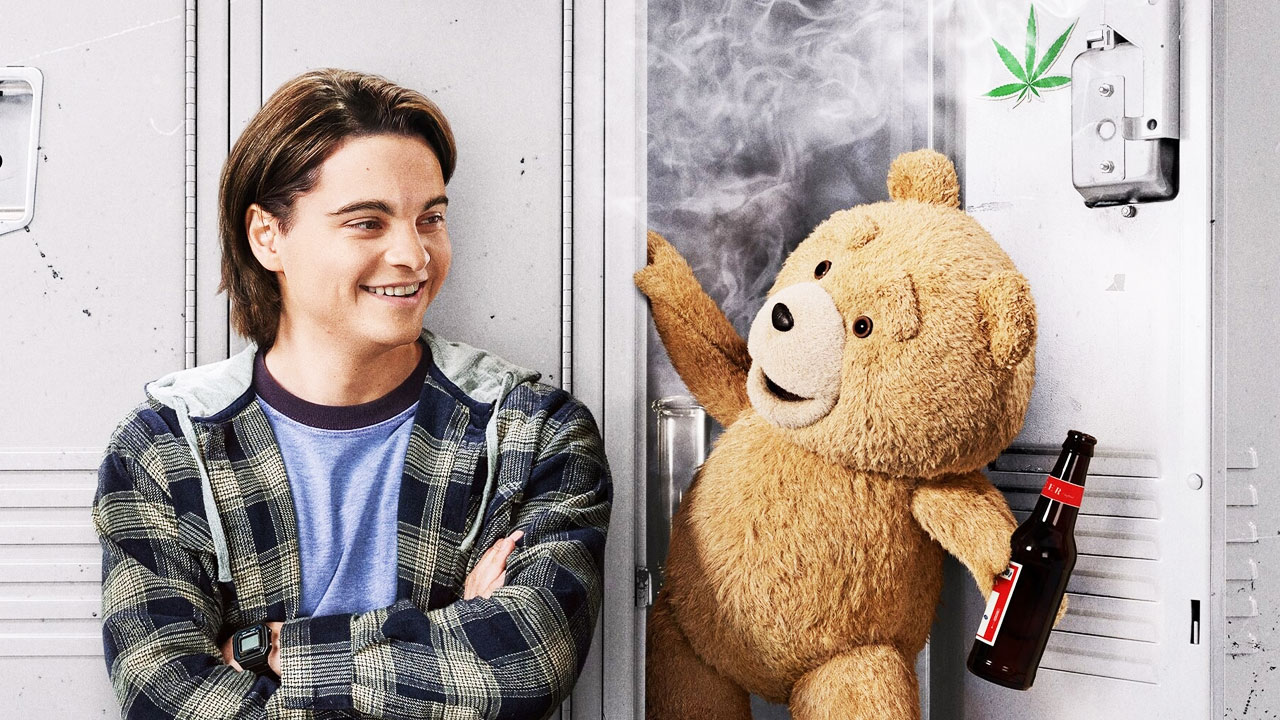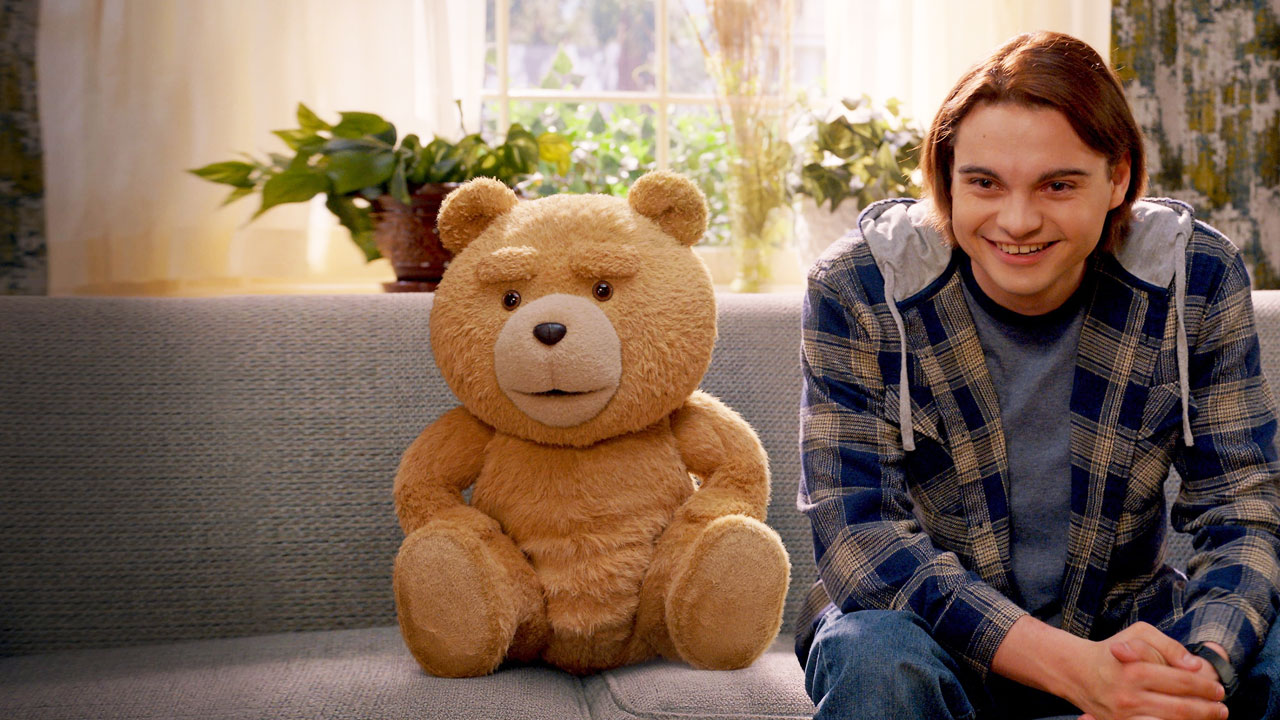The Ted TV show is a surprisingly charming coming-of-age series
It’s a sweeter shift from Seth MacFarlane’s feature films: a spoonful of bong water helps the medicine go down.

With no Marky Mark and a fresh 1990s setting, Seth MacFarlane’s serialised prequel to his raunchy Ted films takes a more low-key, gentle approach. Luke Buckmaster is pleasantly surprised.
The tone of Seth MacFarlane’s Ted TV series is gentler, sweeter and less risqué than the films, which follow two air-headed man-children: one a mid-30s employee of a car hire company (played by Mark Wahlberg) and the other a potty-mouthed teddy bear (voiced by MacFarlane). Perhaps MacFarlane adjusted his lewdness levels to make something more broadly palatable for a coming-of-age story. Or perhaps this is more a matter of what happens when a movie is converted into a sitcom or sitcom-ish format, embracing a less frantic structure and emphasising a smaller number of locations—the family home, like in many sitcoms, being the most prominent.
There’s a thoroughly pleasant domesticity about this small screen spin-off that took me by surprise. It’s an origin story, of sorts, addressing matters of critical import such as the first time John and Ted smoked weed and the first time they watched a porno. Here John is a 16-year-old (endearingly played by Max Burkholder) flubbing through adolescence, living with his incorrigible father Matty (Scott Grimes), sweet but naive mother Susan (Alanna Ubach), sassy older cousin Blaire (Giorgia Whigham), and of course his trash-talking furry friend, who was magicked into sentient existence when John wished upon a shooting star as a child.
In the films, Ted is a manifestation of arrested development: a formative experience that should’ve been left in childhood but clung on, stunting the protagonist’s growth, returning him to juvenility. Ted is now a fixture of continuity during the turbulent years of his best friend’s teenagehood. The first episode begins with a scene that will resonate with former 90s gamers: John retrieves a Nintendo cartridge that hasn’t loaded properly and blows on it, triggering a throwaway joke from the vulgar Ted about oral sex. MacFarlane’s attitude seems to be: keep the bar low and the sweet stuff can come later. Or: a spoonful of bong water helps the medicine go down.
A discussion about political correctness soon follows, with Blaire scolding Ted for using the word “midget”—a term the bear attempts to co-opt. Many more moments like this reflect an attitude more befitting of contemporary times than cultural conversations from the 1990s. Is MacFarlane’s career so mired in discussions about political correctness that it’s affected his understanding of history? Either way, Ted is a reminder that all period pieces view the past through the prism of the present, details like decor and settings always subordinated to the filmmakers’ attitude and sensibility.
The show’s plotlines revolve around classic scenarios from the genre of teenage experience i.e. experimenting with drugs, dealing with bullies, flubbing through sexual encounters, losing and finding yourself. These familiar pivots are zhushed up a little by the presence of a trash-talking, bong-smoking teddy, who could be interpreted as a manifestation of MacFarlane himself, endlessly rattling off decorum-breaking jokes with a “didn’t really mean it” demeanour and (despite his rudeness) an obvious desire to be loved.

MacFarlane (who created the series, directed all episodes, and co-wrote it with five other writers) has been pumping out impertinent comedy for so long he knows to walk a line, and how to vomit all over it—often choosing the latter. But not so much here. The series has a moral compass, partly formed by MacFarlane handballing the really bad stuff to Matty: a Homer Simpson or Peter Griffin style dolt who’s hideously prejudiced—racist, chauvanistic, homophobic, xenophobic, the works. He’s the sort of person who hates the idea of gays in the military, hates the concept of welfare, and is nostalgic for a time when he could offend anybody and not be called out on it. MacFarlane’s perspective, as always, is that it’s better to laugh than cry, but the show never laughs with Matty. Nor does it entirely throw him out with the trash. The characters are well-judged and multi-dimensional.
“You get cancer, you don’t have to pay taxes,” Matty blabbers in the third episode to Blaire, who is the voice of reason cutting through BS. When she bites, and responds that she doesn’t think that’s true, he shoots back: “not if the liberals have their way!” We learn in this episode that Matty wants to avoid a colonoscopy, because he fears that when he’s out of it, unconscious, he might reveal something he did during the Vietnam War.
I won’t spoil the joke: it’s very gross and very MacFarlane. In many ways however this show is slight, modest, even a little tender. It doesn’t pop and crackle like the original movie, but I appreciated the change of pace: breezy viewing that’s well-made, moreish, and sometimes surprisingly delightful.























